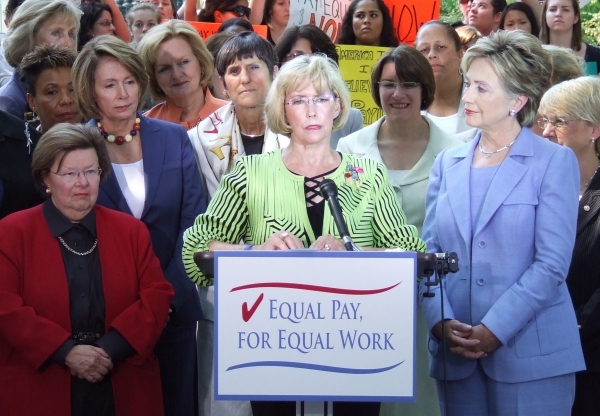SAXTONS RIVER — E. Jean Carroll is sticking to her story.
She's the high-profile woman who is suing Donald Trump, alleging that he raped her in the 1990s in a posh New York department store dressing room. Twenty-five other women have also accused the former president of sexual abuse and harassment, and it's no surprise that he's denying all of the accusations.
Now, New York Governor Andrew Cuomo is in trouble. As of March, seven women have accused him of sexual harassment or inappropriate conduct.
Lindsey Boylan, a former aide to the governor, was the first to accuse Cuomo, writing that he “created a culture within his administration where sexual harassment and bullying is so pervasive that it is not only condoned but expected.”
As a result of all these allegations, Cuomo faces an independent investigation by the New York state no-nonsense Attorney General Letitia James, who will lead the probe into the women's claims.
* * *
But women whistleblowers aren't just about exposing powerful machismo guys whose view of women resides in sexual fantasies.
When Lilly Ledbetter learned that Goodyear - where she worked for 19 years, at one point as the sole female supervisor - was paying her less per year than men in supervisory positions, she filed a sex discrimination case. And she won.
However, that judgment was reversed by an appeals court because Goodyear lawyers argued that she hadn't filed the suit in time. The case went to the Supreme Court, which upheld the appeals court decision.
In her dissent, Justice Ruth Bader Ginsburg declared, “Pay disparities often occur, as they did in Ledbetter's case, in small increments; cause to suspect that discrimination is at work develops only over time.”
The case ultimately led to passage of the Lilly Ledbetter Fair Pay Act of 2009, which is still practiced in the breach.
* * *
There are many other tales of notable, courageous women whistleblowers, none more well-known than that of Karen Silkwood, who claimed in the 1970s that Kerr-McGee, where she was a chemical technician, was not maintaining plant safety and was involved in a number of unexplained dangerous exposures to plutonium.
A member of the Oil, Chemical and Atomic Workers International Union and an activist, she gathered evidence for the union to support her claims. She subsequently died in an unexplained, highly suspicious car accident.
Less well known are women like Marsha Coleman-Adebayo, a senior policy analyst in the Environmental Protection Agency, who blew the whistle on the EPA for racial and gender discrimination in violation of the Civil Rights Act of 1964 after she was removed from her position in South Africa for bringing to EPA's attention dangerous conditions in a U.S. company that was exposing African workers to dangerous mining conditions.
That case led to passage of the No FEAR Act in 2002 that made federal agencies more accountable for employee complaints.
In 2005, a former chief civilian contracting officer for the U.S. Army Corps of Engineers, Bunny Greenhouse, exposed illegality in the no-bid contracts for reconstruction in Iraq by a Halliburton subsidiary. The Army then retaliated against her by demoting her and removing her from her job as a high-level contractor.
She subsequently testified before the Senate Democratic Policy Committee about her experience.
FBI whistleblower Jane Turner, an agent for 25 years, blew the whistle on the mishandling of child sex-crime cases on North Dakota Indian reservations, for which she was removed from her position.
In 2005, a U.S. Court of Appeals upheld Turner's right to a jury trial against the FBI and the right to monetary damages.
Turner also blew the whistle when she witnessed her colleagues stealing items from 9/11 Ground Zero during site inspections. She won a final judgement in 2007, when the Department of Justice vetoed the FBI's appeal of a jury verdict that found the agency guilty of illegal retaliation against Turner.
Her case was used by the U.S. Government Accounting Office and the U.S. Senate in improving the FBI whistleblower program.
Cathy Harris, a former U.S. Customs Service employee, exposed racial profiling against Black travelers at Hartsfield-Jackson Atlanta International Airport. Her book, Flying While Black: A Whistleblower's Story, revealed numerous incidents of heinous abuses perpetrated against Black travelers, including body-cavity searches and long detentions in local hospitals where Black travelers were subjected to bowel monitoring aimed at discovering drugs.
Her book also revealed hideous abuses of authority in Customs Service practices and behaviors, including violence, racial and sexual harassment, stalking on and off the job, and a host of other violations and illegalities.
* * *
All whistleblowers are brave people who care deeply about the injustices they witness, experience, or learn about. All of them are routinely subjected to humiliation, retaliation, and job loss that can impact their careers in devastating ways.
But women whistleblowers often suffer in ways men don't, simply because they are female.
They are less likely to be believed and more likely to have their reputations permanently damaged. They are called crazy and tagged as troublemakers. They are treated like pariahs by power brokers outside their own organizations because of the truths they tell.
All of that speaks to the courage they display when they risk revealing abuse, corruption, and illegality.
It also speaks to why they deserve our respect, and gratitude, because in many instances they may literally be saving our lives.
